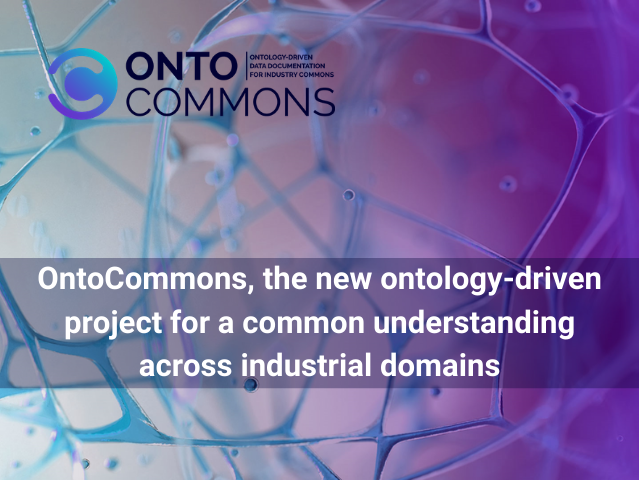OntoCommons, the new ontology-driven project for a common understanding across industrial domains
"OntoCommons provides a reliable turnkey solution for industrial stakeholders to confidently use ontologies in their businesses and to share their data. In addition, OntoCommons will prove the long-awaited key role of ontology in ensuring data interoperability and will promote data-driven innovation by boosting trust in the semantics of the shared industrial data." Hedi Karray – OntoCommons Technical Coordinator OntoCommons, the new H2020 CSA initiative launched on 1st November 2020, aims to create harmonised and ontology-driven data documentation for Industry Commons, overcoming interoperability bottlenecks and facilitating data sharing and valorisation. Over its thirty-six-month duration, the project will bring together and coordinate data documentation and standardisation activities from the most relevant EU and international stakeholders and initiatives. The coordination activity will result in the orchestration of an Ontology Commons EcoSystem (OCES), composed of existing tools and specifications in order to achieve FAIR data documentation in the NMBP application domains. The effectiveness of the Ontology EcoSystem will be tested through a set of demonstration cases, covering several application domains. In order to build impactful demonstrators, OntoCommons will explore potential by building a strong community of subject experts, ontologists, implementers, industrial stakeholders, and end users. Building a community of experts is extremely essential to the success of the project, which will rely strongly on the feedback of both stakeholders and demonstrators. Sustainability Manager Michela Magas and Coordinator Nadja Adamovic presented the OntoCommons project early in September 2020 during the EU Research & Innovation Days. During the presentation, Michela Magas outlined why there is a need for a common understanding across industrial domains: "The word 'product' is associated with very different terms in each domain. So, the word product means one thing in one domain and another thing in another. This is for a very good reason and it should stay that way. There is no point in standardising this at application level. Knowledge graphs are therefore very different for particular use cases and different domains and domain ontologies are used, that have evolved from the culture of product or the culture of service within that domain. Where domain ontologies are being regularly used, we don't want to touch them. What we do want, however, is to be able to bridge between some of these knowledge areas and introduce systems of translation or a way to interoperate that allows us to understand each other. And for that reason, we are starting with the project OntoCommons, which is the very first step in establishing the Industry Commons". Moreover, Nadja Adamovic pointed out a key characteristic of the Ontology Commons EcoSystem which is its inclusive and pluralistic approach: the tools included in the EcoSystem will be existing, state-of-the-art tools, not tools developed within the project. Not one, but multiple ontologies have been included for the creation of the Top Reference Ontology, in order to integrate as many stakeholders and communities as possible and maximise the impact. "The reason behind it is that there's plenty already done. Our task is to have a survey and see what's available and what should be included in order to support the EcoSystem. Of course, the specifications will be for tools too, because they have to be compatible and the system has to be harmonised together with the ontologies. The tools will be used to build, harmonise, visualise, and optimise ontologies, and for data documentation processes". For more information, please visit https://ontocommons.eu/(opens in new window)



